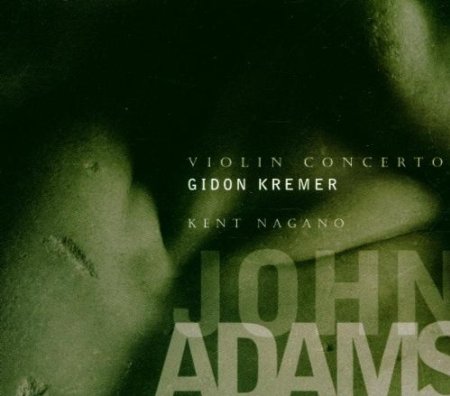J Adams Violin Concerto; Shaker Loops
View record and artist detailsRecord and Artist Details
Composer or Director: John Adams
Genre:
Orchestral
Label: Nonesuch
Magazine Review Date: 6/1996
Media Format: CD or Download
Media Runtime: 59
Mastering:
DDD
Catalogue Number: 7559-79360-2

Tracks:
| Composition | Artist Credit |
|---|---|
| Shaker Loops |
John Adams, Composer
John Adams, Composer John Adams, Conductor St Luke's Orchestra |
| Concerto for Violin and Orchestra |
John Adams, Composer
Gidon Kremer, Violin John Adams, Composer Kent Nagano, Conductor London Symphony Orchestra |
Author:
A superb CD that displays two very different aspects of John Adams’s evolving art, Shaker Loops dancing to a minimalist pulse, lean, fidgety and cleverly designed (the accelerating ‘take-offs’ in “A final shaking” are extremely effective), and the altogether deeper, more intimate Violin Concerto. In fact, my first reaction to the concerto (a pretty personal one, I admit) was that it resembles Berg – not his Violin Concerto, but Wozzeck, Act 3 scene 4, where an eerie ‘drainage’ effect symbolizes Wozzeck’s drowning beneath a blood-red moon. This aural fluidity is common to both works (the scoring is similar, too), although Adams keeps up the momentum for the entire duration of his long first movement, shifting colours constantly until 11'44'' when a brief solo passage marks a slowing down in preparation for the ensuing Chaconne. Here, a quiet chiming suggests parallels with Arvo Part (Tabula rasa springs immediately to mind), while Adams floats his mysterious textures above a quietly undulating accompaniment (note those delicate flutes at 7'56''). The Sibelius of Tapiola seems to hover somewhere around 5'49'' into the first movement (just as parts of Shaker Loops suggest an up-tempo Lemminkainen) and the concerto ends with a fast dancing Toccata.
As to the solo line (much of it engaging the violinist in double-stopped passagework), Adams himself admits that it is “almost never ending”, but in the hands of Gidon Kremer – whose sinewy, lightly-bowed tone suits the piece perfectly – it is a compelling monologue. Adams’s Violin Concerto takes its spiritual theme from poet Robert Hass’s Body through which the dream flows and is dedicated to the late David Huntley, “friend and longtime enthusiast of new music” and a considerable force at Boosey & Hawkes in America.
Shaker Loops is earlier, easier and rather less durable than the Violin Concerto. It started life as a string quartet (Wavemaker), then – beyond drastic recomposition – filled out to a septet which, suitably augmented, is how we hear it here. The term “Shaker” refers to the frenzied dancing of a religious sect and Adams’s four-part structure sets up a varied roster of tempos and textures. There have been other recordings of the work, but this is surely the best – agile, precise and extremely well balanced. It makes an enjoyable coupling for the Violin Concerto, but it seems to me that the ‘later’ Adams is a more arresting proposition than his younger self. The sound is excellent.'
As to the solo line (much of it engaging the violinist in double-stopped passagework), Adams himself admits that it is “almost never ending”, but in the hands of Gidon Kremer – whose sinewy, lightly-bowed tone suits the piece perfectly – it is a compelling monologue. Adams’s Violin Concerto takes its spiritual theme from poet Robert Hass’s Body through which the dream flows and is dedicated to the late David Huntley, “friend and longtime enthusiast of new music” and a considerable force at Boosey & Hawkes in America.
Shaker Loops is earlier, easier and rather less durable than the Violin Concerto. It started life as a string quartet (Wavemaker), then – beyond drastic recomposition – filled out to a septet which, suitably augmented, is how we hear it here. The term “Shaker” refers to the frenzied dancing of a religious sect and Adams’s four-part structure sets up a varied roster of tempos and textures. There have been other recordings of the work, but this is surely the best – agile, precise and extremely well balanced. It makes an enjoyable coupling for the Violin Concerto, but it seems to me that the ‘later’ Adams is a more arresting proposition than his younger self. The sound is excellent.'
Discover the world's largest classical music catalogue with Presto Music.

Gramophone Digital Club
- Digital Edition
- Digital Archive
- Reviews Database
- Full website access
From £8.75 / month
Subscribe
Gramophone Full Club
- Print Edition
- Digital Edition
- Digital Archive
- Reviews Database
- Full website access
From £11.00 / month
Subscribe
If you are a library, university or other organisation that would be interested in an institutional subscription to Gramophone please click here for further information.




